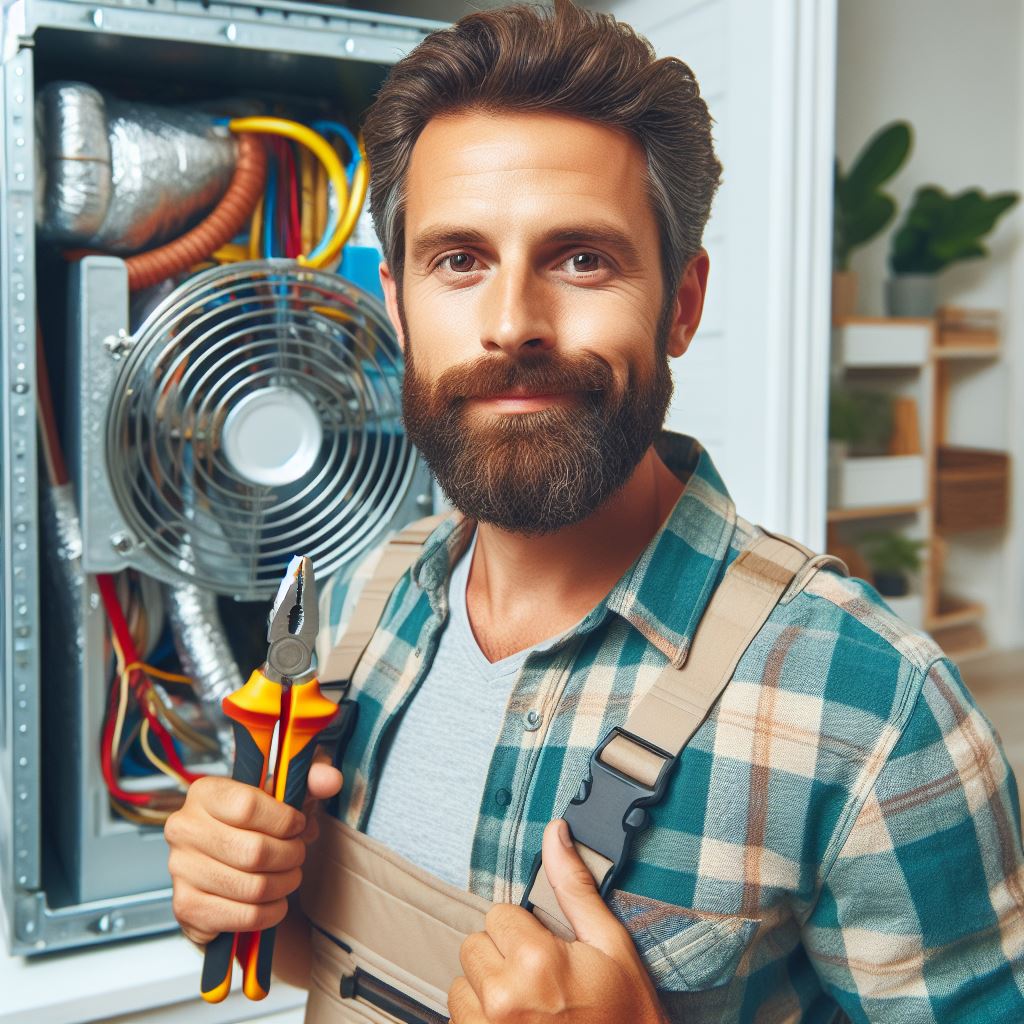Introduction
When purchasing a new home, there are countless factors to consider.
From location to layout, each detail plays a crucial role in making the right decision.
However, one aspect that is often overlooked but holds significant importance is the HVAC (Heating, Ventilation, and Air Conditioning) system.
This system is the heartbeat of your home, regulating temperature, humidity, and air quality.
Therefore, ensuring its functionality is paramount to the comfort and safety of your future dwelling.
In this blog post, we aim to shed light on the critical importance of inspecting the HVAC system when buying a house.
We’ll delve into why this inspection is crucial, what potential issues to look out for, and how it can ultimately save you time, money, and headaches down the road.
Throughout this post, we’ll cover various aspects of HVAC system inspections.
Firstly, we’ll discuss why inspecting the HVAC system is vital during the home-buying process.
Next, we’ll delve into the specific components of the HVAC system that should be thoroughly examined, including the furnace, air conditioner, ductwork, and thermostat.
We’ll highlight common problems that may arise with each component and how they can impact your living conditions and finances.
Additionally, we’ll explore the importance of hiring a qualified inspector and what questions to ask during the inspection process.
Finally, we’ll conclude with actionable tips on how to address any issues found during the inspection and negotiate with sellers to ensure a fair deal.
By the end of this blog post, you’ll have a comprehensive understanding of why inspecting the HVAC system is a non-negotiable step when buying a house.
Armed with this knowledge, you’ll be better equipped to make informed decisions and ensure that your future home provides optimal comfort and efficiency for years to come.
Transform Your Real Estate Decisions
Unlock personalized real estate insights crafted just for you. Get actionable advice designed to amplify your success.
Get StartedUnderstanding HVAC Systems
Definition and Purpose of HVAC Systems
HVAC, short for Heating, Ventilation, and Air Conditioning, is a crucial aspect of any modern home.
This system regulates the temperature, humidity, and air quality within a building to ensure comfort and safety for its occupants.
The primary purpose of an HVAC system is to create a comfortable indoor environment while also maintaining adequate ventilation and air quality.
Components of an HVAC System
- Heating System: The heating system is responsible for generating warmth during cold weather. It commonly utilizes furnaces, boilers, or heat pumps to produce heat, which is then distributed throughout the home via ductwork, radiators, or underfloor heating systems. The choice of heating equipment depends on factors such as climate, energy efficiency, and fuel availability.
- Ventilation System: The ventilation system ensures the circulation of fresh air throughout the home while removing stale air, odors, and pollutants. Proper ventilation is essential for maintaining indoor air quality and preventing the buildup of harmful gases such as carbon monoxide. Ventilation can be achieved through natural means (such as windows and vents) or mechanical systems (such as fans and ductwork).
- Air Conditioning System: The air conditioning system is responsible for cooling the indoor environment during hot weather. It works by extracting heat from the indoor air and transferring it outside, thereby lowering the temperature indoors. Air conditioners come in various types, including central air conditioning systems, ductless mini-split systems, and window units. Factors such as climate, energy efficiency, and the size of the space will influence the choice of air conditioning equipment.
In short, understanding the components of an HVAC system is essential when inspecting a future home.
A well-maintained HVAC system not only provides comfort but also contributes to energy efficiency and indoor air quality.
During the inspection process, it’s important to assess the condition and efficiency of each component to ensure that the HVAC system meets the needs of the occupants and is capable of providing reliable performance for years to come.
Read: Structural Essentials in Home Inspections
Importance of HVAC System Inspection
A home’s HVAC (Heating, Ventilation, and Air Conditioning) system is its lifeline, ensuring comfort, safety, and efficiency.
When inspecting your future home, paying close attention to the HVAC system is paramount. Here’s why:
Ensuring Safety
- Identifying Potential Fire Hazards: Faulty electrical connections, worn-out components, or accumulated debris can pose fire risks within the HVAC system. A thorough inspection can uncover these hazards, preventing potential disasters.
- Checking for Gas Leaks: Gas-powered furnaces and water heaters are common in many homes. Inspecting for gas leaks ensures the safety of occupants, as even small leaks can lead to carbon monoxide poisoning or explosions if left unchecked.
Assessing System Efficiency
- Evaluating Energy Consumption: An inefficient HVAC system can significantly inflate energy bills. Inspection allows for the evaluation of the system’s efficiency, identifying areas for improvement such as outdated equipment or inadequate insulation.
- Checking Insulation and Ductwork: Poorly insulated ductwork or leaks can lead to significant energy loss. Inspecting insulation and ductwork helps ensure optimal performance, reducing energy waste and enhancing comfort levels.
Identifying Potential Costly Repairs
- Examining the Age of the System: HVAC systems have a limited lifespan, typically ranging from 10 to 15 years depending on maintenance and usage. Assessing the age of the system during inspection provides insight into its remaining lifespan and potential need for replacement.
- Looking for Signs of Wear and Tear: Components of HVAC systems undergo wear and tear over time. Inspecting for signs such as rust, corrosion, or unusual noises helps identify potential breakdowns or costly repairs, allowing for proactive maintenance.
In a nutshell, conducting a comprehensive inspection of the HVAC system in your future home is crucial for safety, efficiency, and financial planning.
By addressing potential hazards, assessing efficiency, and identifying repair needs, you can ensure a comfortable and secure living environment for years to come.
Read: Navigating Interest Rates for Home Loans in 2024

Steps to Inspect the HVAC System
When inspecting your future home, it is crucial to pay close attention to the HVAC system, as it plays a critical role in maintaining a comfortable and healthy living environment.
Having a thorough understanding of the steps involved in inspecting the HVAC system can help you identify any potential issues and make an informed decision about your new home.
Showcase Your Real Estate Business
Publish your company profile on our blog for just $200. Gain instant exposure and connect with a dedicated audience of real estate professionals and enthusiasts.
Publish Your ProfileChecking the exterior
The first step in inspecting the HVAC system is to carefully examine the exterior components. This includes the outdoor unit, which houses the condenser and other vital parts of the system.
- Inspecting the outdoor unit: Look for any signs of damage, such as dents or bent fins. Check if the unit is securely mounted and level.
- Assessing the condition of the unit: Examine the coils for dirt or debris, as this can affect the unit’s efficiency. Check the fan blades for any cracks or excessive wear.
By checking the exterior components, you can get a sense of the overall condition of the HVAC system and identify any potential red flags.
Evaluating the interior components
Once you’ve examined the exterior, it’s time to focus on the interior components of the HVAC system. This includes the furnace, air conditioning unit, and ventilation system.
- Examining the furnace: Start by inspecting the furnace for cleanliness and proper function. Look for any signs of rust, cracks, or leaks in the heat exchanger.
- Checking the air conditioning unit: Evaluate the air conditioning unit for leaks, which could indicate refrigerant problems. Ensure that all components, such as the compressor and evaporator coils, are in good working condition.
- Inspecting the ventilation system: Take a close look at the ventilation system, including the air ducts. Check for any signs of blockages, such as dust or debris, that could hinder proper airflow.
By evaluating the interior components, you can determine the overall functionality and efficiency of the HVAC system.
It’s essential to address any issues or concerns before finalizing the purchase of your new home.
All in all, inspecting the HVAC system is a crucial step when evaluating your future home.
By checking the exterior components, including the outdoor unit, coils, and fan blades, you can assess the system’s overall condition.
Additionally, evaluating the interior components, such as the furnace, air conditioning unit, and ventilation system, ensures proper functionality and identifies any potential problems.
Taking the time to thoroughly inspect the HVAC system will provide peace of mind and help you make a sound decision about your new home.
Read: First-Time Buyer Mortgages: A Comprehensive Guide
Hiring a Professional HVAC Inspector
When it comes to purchasing a new home, ensuring that the HVAC (Heating, Ventilation, and Air Conditioning) system is in top-notch condition is paramount.
This system not only contributes to your comfort but also affects your health and the overall value of your investment.
Therefore, hiring a professional HVAC inspector is crucial to assess the system’s functionality thoroughly.
Importance of Professional Inspection
A professional HVAC inspection goes beyond a simple visual check.
It involves a comprehensive assessment of the system’s components, including the furnace, air conditioner, ductwork, thermostat, and ventilation.
Such an inspection can uncover hidden issues like leaks, inadequate insulation, or inefficient equipment, which could lead to costly repairs or replacements down the line.
Qualifications to Look for in an Inspector
When selecting an HVAC inspector, ensure they possess relevant qualifications and certifications.
Look for credentials such as NATE (North American Technician Excellence) certification, which indicates expertise in HVAC installation, maintenance, and repair.
Additionally, inquire about their experience in the field and whether they stay updated on the latest industry standards and technologies.
Questions to Ask When Hiring an Inspector
- Are you licensed and insured? Ensure the inspector holds the necessary licenses and carries liability insurance to protect both parties in case of accidents or damages during the inspection.
- Can you provide references? Request references from previous clients to gauge the inspector’s reputation and the quality of their work.
- What does the inspection entail? Seek clarification on the specific components and areas the inspection will cover to ensure thoroughness.
- Do you offer any guarantees or warranties? Inquire about any guarantees on the inspection findings or warranties on their services.
- What is the estimated timeline and cost? Obtain details regarding the duration of the inspection and the associated fees to plan accordingly.
Therefore, entrusting the inspection of your future home’s HVAC system to a qualified professional is a wise investment.
By carefully selecting an inspector with the right qualifications and asking pertinent questions, you can gain valuable insights into the condition of the system, ensuring your peace of mind and the comfort of your new home for years to come.
Read: Pre-Inspection Checklist for Home Buyers
Common HVAC Issues to Look Out For
When inspecting your future home, paying close attention to the HVAC system is paramount.
A malfunctioning HVAC system can lead to discomfort, health hazards, and costly repairs. Here are five common issues to look out for:
Inadequate Heating or Cooling
One of the most noticeable problems is inadequate heating or cooling.
This issue could stem from an undersized HVAC unit, faulty thermostat, or blocked airflow due to dirty filters or ductwork.
Be sure to check if the system adequately maintains a comfortable temperature throughout the house, especially in extreme weather conditions.
Uneven Temperature Distribution
Uneven temperature distribution indicates potential issues with ductwork, insulation, or zoning.
Certain areas of the house might feel significantly warmer or cooler than others, leading to discomfort and energy inefficiency.
A thorough inspection of ducts and insulation can reveal any leaks or gaps contributing to this problem.
Showcase Your Real Estate Business
Publish your company profile on our blog for just $200. Gain instant exposure and connect with a dedicated audience of real estate professionals and enthusiasts.
Publish Your ProfilePoor Indoor Air Quality
Indoor air quality is crucial for your health and well-being.
Signs of poor air quality include persistent odors, excessive dust buildup, or respiratory issues among occupants.
Inspect the HVAC system for proper ventilation, adequate filtration, and the presence of pollutants like mold or volatile organic compounds (VOCs).
Noisy Operation
A properly functioning HVAC system should operate quietly in the background.
Loud or unusual noises such as banging, rattling, or whistling could indicate mechanical problems, loose components, or airflow restrictions.
Pay attention to these noises during the inspection and address them promptly to prevent further damage.
Water Leaks or Excess Humidity
Water leaks or excess humidity within the home can lead to mold growth, structural damage, and health concerns.
Inspect the HVAC system for any signs of water accumulation, such as dripping pipes, condensation on ducts, or moisture around the unit.
Additionally, ensure that the system effectively controls indoor humidity levels to maintain a comfortable and healthy environment.
Essentially, being aware of these common HVAC issues during your home inspection can help you identify potential problems early on and make informed decisions.
Prioritize a thorough evaluation of the HVAC system to ensure comfort, efficiency, and indoor air quality in your future home.
Conclusion
In this blog post, we discussed the main points to consider when inspecting an HVAC system in a potential new home.
From assessing the age and condition of the system to examining ductwork and airflow, we’ve covered essential aspects that can impact your comfort and budget in the long run.
The importance of thoroughly inspecting the HVAC system before purchasing a home cannot be overstated.
Your HVAC system is the heart of your home’s comfort infrastructure, and any issues or inefficiencies can lead to discomfort and significant expenses down the line.
By taking the time to evaluate the system during the home inspection process, you can make informed decisions and potentially avoid costly surprises.
We strongly encourage homebuyers to seek professional guidance from HVAC experts during the inspection process.
While you may be able to spot obvious red flags, a trained technician can provide a more comprehensive assessment, identifying hidden issues and offering valuable insights into the system’s overall health and efficiency.
Investing in a thorough HVAC inspection now can save you time, money, and hassle in the future, ensuring that your new home is equipped with a reliable and efficient heating and cooling system.
In the end, when evaluating a potential new home, don’t overlook the importance of inspecting the HVAC system.
By prioritizing this aspect of the inspection process and enlisting the help of qualified professionals, you can make confident decisions and enjoy peace of mind knowing that your future home is equipped to keep you comfortable year-round.




